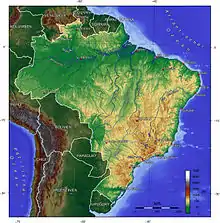Great Escarpment, Brazil
The Great Escarpment in Brazil is a major geological formation that runs along much of the eastern coast of Brazil south of the city of Salvador. The escarpment runs along the central and south Atlantic coasts of Brazil, rising sharply and separating the highland plateau from the coast.[1]

Topographical map of Brazil
The escarpment rises steeply from the coas\tal plain to as much as 9,000 feet (2,700 m) in height.[2] The top of the escarpment forms a drainage divide between the interior and the coastal plains.[3] Apart from the São Francisco River, most streams flow into the central basin rather than to the coast.[2] The escarpment defines the eastern edge of the Serra do Mar and other mountain ranges.[4][5]
References
Citations
- Baer 2001, p. 5.
- McColl 2005, p. 113.
- Goudie 2004, p. 764.
- Ollier & Pain 2000, p. 217.
- Crocitti 2011, p. 583.
Sources
- Baer, Werner (2001-05-30). The Brazilian Economy: Growth and Development, 5th Edition. ABC-CLIO. ISBN 978-0-313-38986-3.CS1 maint: ref=harv (link)
- Crocitti, John J. (2011-12-31). Brazil Today: An Encyclopedia of Life in the Republic. ABC-CLIO. ISBN 978-0-313-34672-9. Retrieved 2012-11-30.CS1 maint: ref=harv (link)
- Goudie, Andrew (2004). Encyclopedia of geomorphology: A-I. Psychology Press. ISBN 978-0-415-32738-1. Retrieved 30 November 2012.CS1 maint: ref=harv (link)
- McColl, R. W. (2005-01-01). Encyclopedia of World Geography. Infobase Publishing. p. 113. ISBN 978-0-8160-7229-3. Retrieved 2012-11-30.CS1 maint: ref=harv (link)
- Ollier, Cliff; Pain, Colin F. (2000). The Origin of Mountains. Psychology Press. ISBN 978-0-415-19889-9. Retrieved 2012-11-30.CS1 maint: ref=harv (link)
This article is issued from Wikipedia. The text is licensed under Creative Commons - Attribution - Sharealike. Additional terms may apply for the media files.